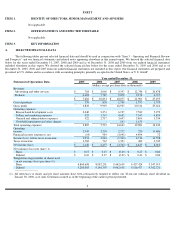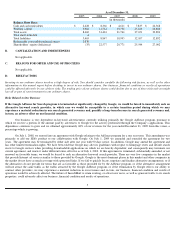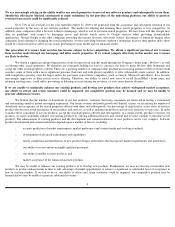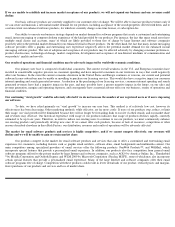Incredimail 2009 Annual Report Download - page 18
Download and view the complete annual report
Please find page 18 of the 2009 Incredimail annual report below. You can navigate through the pages in the report by either clicking on the pages listed below, or by using the keyword search tool below to find specific information within the annual report.
If we fail to detect and stop misrepresentations of our site and products, or for some reason are perceived as promoting malware or
“spamming”,
we could lose the confidence of our customers, or software could be blocked by software or utilities designed to detect such
practices, thereby causing our business to suffer.
We are exposed to the risk of domains using our brand names (such as "IncrediMail") in various ways, and attracting in this manner our
potential or existing users. Many times these domains are engaged with fraudulent or spam activities and using our brand names can result in
damaging our reputation and losing our clients' confidence in our products. In addition, if we or our products were for some reason perceived as
promoting “malware or “spamming”,
our software could be blocked by software or utilities designed to detect such practices. If we are unable to
detect and terminate effectively this misrepresentation activity of others or the way we and our products are perceived, we may lose users and
our ability to produce revenues will be harmed.
If we are unable to protect our intellectual property rights, our competitive position could be harmed.
Our ability to execute our business strategy and compete depends in part upon our ability to protect our intellectual property. In 2003,
we submitted national phase patent applications in the United States, the European Community and Israel with respect to certain processes that
we employ in our products. These applications benefited from a priority date of a provisional application filed in the year 2000. One patent has
been issued in the United States under these applications to date. Our pending and future patent applications may not issue as patents or, if
issued, may not issue in a form that will be advantageous to us. Any issued patents may be challenged, invalidated or legally circumvented by
third parties. We cannot be certain that our patents will be upheld as valid and enforceable or prevent the development of competitive products.
Consequently, competitors could develop, manufacture and sell products that directly compete with our products, which could decrease our sales
and diminish our ability to compete. If our intellectual property does not adequately protect us from our competitors’
products and methods, our
competitive position could be adversely affected and we could be precluded from operating all or a portion of our business.
In addition, we exploit our brand name Incredi
by applying it to products offered through collaborations with third parties. We have
registered INCREDIMAIL as a trademark only in the United States. Our ownership and use of the Incredi
brand name may be challenged,
invalidated or legally circumvented by third parties, in which case our ability to generate revenues from its exploitation will suffer.
We have registered, or have rights to, various domain names relating to our brand, including incredimail.com, incredidate.com,
incredigames.com, magentic.com, photojoy.com and hiyo.com. If we fail to maintain, or to enforce our rights to these registrations, it will be
difficult for us to implement our strategy to increase recognition of our brand. Third parties have registered domain names similar to ours and if
such parties engage in a business that may be harmful to our reputation or confusing to our customers, our revenue may decline and we may
incur additional expenses in maintaining our brand.
We rely on a combination of patent and other intellectual property laws and confidentiality, non-
disclosure and assignment of
inventions covenants as appropriate, with our employees and consultants, to protect and otherwise seek to control access to, and distribution of,
our proprietary information. These measures may not be adequate to protect our property from unauthorized disclosure, third-
party infringement
or misappropriation. We also rely on trade secret protection for our technology, in part through confidentiality covenants with our employees,
consultants and third parties. However, these parties may breach these covenants and we may not have adequate remedies for any breach. Also,
others may learn of our trade secrets through a variety of methods. In addition, the laws of certain countries in which we sell our products may
not protect our intellectual property rights to the same extent as the laws of the United States or Israel. See “Item 4.B Business Overview
—
Intellectual Property.”
Third party claims of infringement or other claims against us could require us to redesign our products, seek licenses, or engage in
future costly intellectual property litigation, which could adversely affect our financial position and our ability to execute our business
strategy.
The appeal of our products is largely the result of the graphics, sound and multimedia content that we incorporate in our products. We
enter into licensing arrangements with third parties for these uses. However, other third parties may from time to time claim that our current or
future use of content, sound and graphics infringe their intellectual property rights, and seek to prevent, limit or interfere with our ability to
make, use or sell our products. For example, in 2002 and again in 2004, a third party had contacted us to demand that we remove certain
“Smiley”
graphics from our website, claiming that he had registered a trademark with respect to these graphics and that our use infringed his
rights. We believe this claim to be without any merit and intend to vigorously defend any suit filed against us in this matter.
14
























